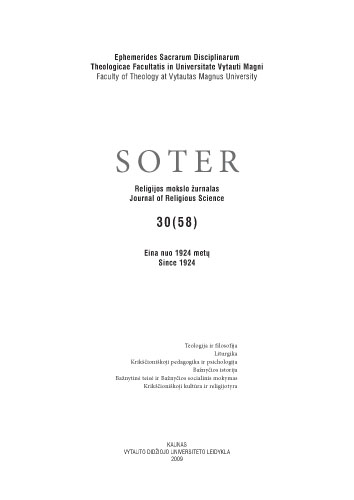RELIGIOUS SOCIALIZATION IN A FAMILY AS A FACTOR OF FORMATION OF RELIGIOUS IDENTITY
Religinė socializacija šeimoje kaip religinio tapatumo formavimosi veiksnys
Author(s): Živilė AdvilonienėSubject(s): Christian Theology and Religion
Published by: Vytauto Didžiojo Universitetas
Keywords: religinė patirtis; religinė praktika; religinis tapatumas; religinė socializacija; religinės patirties ir praktikos formavimosi modeliai; religious experience; religious practice; religious identity; religious socialization; models of religious experience
Summary/Abstract: The personality of a child and of a young person, their values, world-view and behavior first of all and mostly is usually formed in a family. Their religious identity as an integral aspect of personal identity is created in a family as well. Family has always played an important role in its formation, especially in a traditional society: it was conveyed from generation to generation, thus its change was complicated. In modern society, on the contrary, it is rather frequently chosen consciously, it becomes multi-dimensional, even loses its transcendental dimension and is transferred into ethical, cultural, social sphere. It is influenced not only by micro-social background, but also by mezzo- and macro-social factors. In this process, a family becomes only one of many social factors, forming a person's religious experience and practice as well as religious identity. All this determines a variety of theoretical and empirical analysis of this phenomenon, introduces new layers of research. The problem of the present research is linked to the scientific interest in the factors of religious experience and practice as well as religious identity, the most common models of approach to religion and of religious practice, peculiarities and types of religious socialization in a family. It has been sought to discuss theoretical and empirical assumptions in the research of the phenomena mentioned above, to empirically distinguish between the prevailing factors and models of religious experience and practice both in Soviet times and at present. To achieve this, we based our assumptions on the theories of the construction of social reality, religious identity and institutionalization of religion. It has been assumed that the expression and elements of personal religious experience and practice are determined by the prevalent attitude to religion in the family and by the formation model of the earliest religious experience and practice. In order to analyze this, the analytic method of scientific sources, in-depth interview (N=28) and content analysis were applied. The interviewees were objectively sampled: we sought to compare religious experience, practice and their factors among the indifferent, "active" and "passive" Catholics (it was measured by involvement into religious-ecclesiastical activity) and among the clergy and religious. Education, age and place of residence were taken as optional sampling criteria. It was assumed that their earliest religious experience, practice and socialization occurred in Soviet times, thus, 25 were chosen as the lowest age limit as it was essential to experience at least minimally the suppression of religious freedom that existed in Soviet times. Within the frames of research the most characteristic factors of religious experience and practice have been traced: micro-social environment (family, friends, and parish community); information (religious and theological books, homilies, catechesis, courses media); changes in publ
Journal: SOTER: religijos mokslo žurnalas
- Issue Year: 58/2009
- Issue No: 30
- Page Range: 79-95
- Page Count: 17
- Language: Lithuanian

